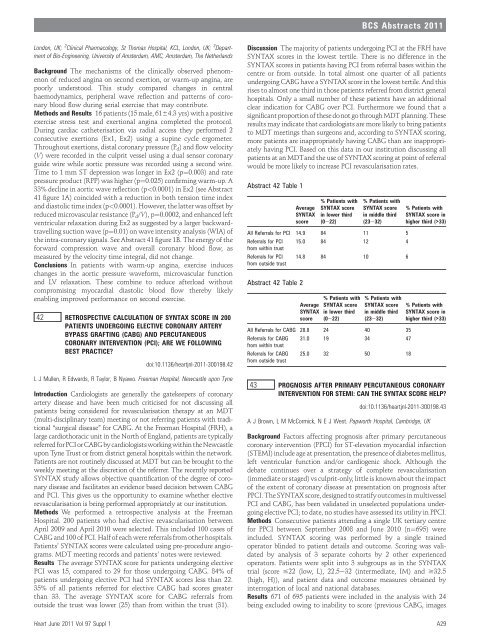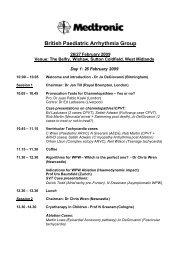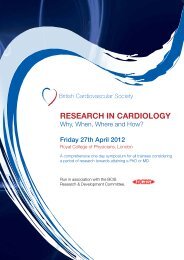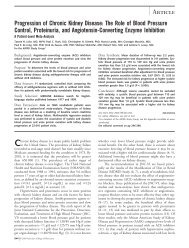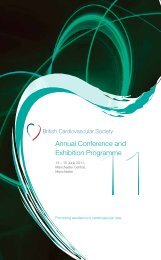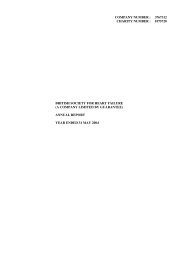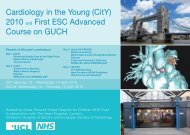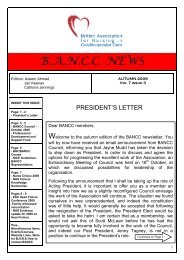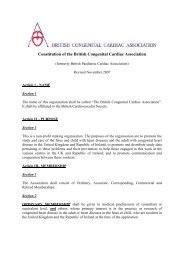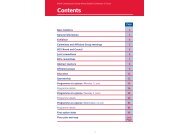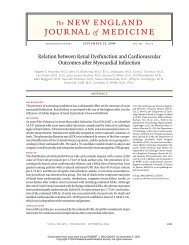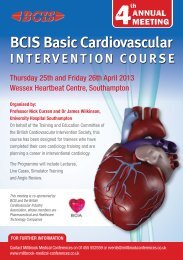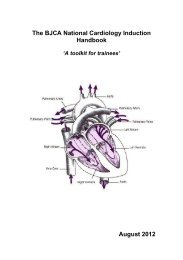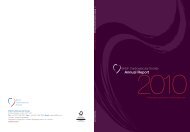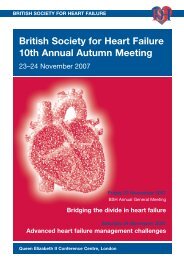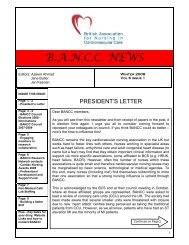Full Supplement - British Cardiovascular Society
Full Supplement - British Cardiovascular Society
Full Supplement - British Cardiovascular Society
You also want an ePaper? Increase the reach of your titles
YUMPU automatically turns print PDFs into web optimized ePapers that Google loves.
BCS Abstracts 2011<br />
London, UK; 2 Clinical Pharmacology, St Thomas Hospital, KCL, London, UK; 3 Department<br />
of Bio-Engineering, University of Amsterdam, AMC, Amsterdam, The Netherlands<br />
Background The mechanisms of the clinically observed phenomenon<br />
of reduced angina on second exertion, or warm-up angina, are<br />
poorly understood. This study compared changes in central<br />
haemodynamics, peripheral wave reflection and patterns of coronary<br />
blood flow during serial exercise that may contribute.<br />
Methods and Results 16 patients (15 male, 6164.3 yrs) with a positive<br />
exercise stress test and exertional angina completed the protocol.<br />
During cardiac catheterisation via radial access they performed 2<br />
consecutive exertions (Ex1, Ex2) using a supine cycle ergometer.<br />
Throughout exertions, distal coronary pressure (P d ) and flow velocity<br />
(V) were recorded in the culprit vessel using a dual sensor coronary<br />
guide wire while aortic pressure was recorded using a second wire.<br />
Time to 1 mm ST depression was longer in Ex2 (p¼0.003) and rate<br />
pressure product (RPP) was higher (p¼0.025) confirming warm-up. A<br />
33% decline in aortic wave reflection (p33)<br />
43 PROGNOSIS AFTER PRIMARY PERCUTANEOUS CORONARY<br />
INTERVENTION FOR STEMI: CAN THE SYNTAX SCORE HELP?<br />
doi:10.1136/heartjnl-2011-300198.43<br />
A J Brown, L M McCormick, N E J West. Papworth Hospital, Cambridge, UK<br />
Background Factors affecting prognosis after primary percutaneous<br />
coronary intervention (PPCI) for ST-elevation myocardial infarction<br />
(STEMI) include age at presentation, the presence of diabetes mellitus,<br />
left ventricular function and/or cardiogenic shock. Although the<br />
debate continues over a strategy of complete revascularisation<br />
(immediate or staged) vs culprit-only, little is known about the impact<br />
of the extent of coronary disease at presentation on prognosis after<br />
PPCI. The SYNTAX score, designed to stratify outcomes in multivessel<br />
PCI and CABG, has been validated in unselected populations undergoing<br />
elective PCI; to date, no studies have assessed its utility in PPCI.<br />
Methods Consecutive patients attending a single UK tertiary centre<br />
for PPCI between September 2008 and June 2010 (n¼695) were<br />
included. SYNTAX scoring was performed by a single trained<br />
operator blinded to patient details and outcome. Scoring was validated<br />
by analysis of 3 separate cohorts by 2 other experienced<br />
operators. Patients were split into 3 subgroups as in the SYNTAX<br />
trial (score #22 (low, L), 22.5e32 (intermediate, IM) and $32.5<br />
(high, H)), and patient data and outcome measures obtained by<br />
interrogation of local and national databases.<br />
Results 671 of 695 patients were included in the analysis with 24<br />
being excluded owing to inability to score (previous CABG, images<br />
Heart June 2011 Vol 97 Suppl 1<br />
A29


